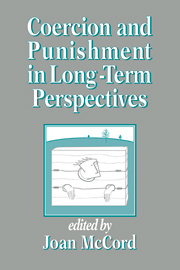Book contents
- Frontmatter
- Contents
- List of contributors
- Acknowledgments
- 1 Introduction: coercion and punishment in the fabric of social relations
- I Mental health, coercion, and punishment
- II Family socialization practices and antisocial behavior
- III Aggression and coercion in the schools
- IV Deviance, crime, and discipline
- 15 The long-term effect of punitive discipline
- 16 Parental monitoring and peer influences on adolescent substance use
- 17 The relative importance of internal and external direct constraints in the explanation of late adolescent delinquency and adult criminality
- 18 Negative social sanctions and deviant behavior: a conditional relationship
- V Measuring and predicting in studies of coercion and punishment
- Name index
- Subject index
15 - The long-term effect of punitive discipline
Published online by Cambridge University Press: 29 September 2009
- Frontmatter
- Contents
- List of contributors
- Acknowledgments
- 1 Introduction: coercion and punishment in the fabric of social relations
- I Mental health, coercion, and punishment
- II Family socialization practices and antisocial behavior
- III Aggression and coercion in the schools
- IV Deviance, crime, and discipline
- 15 The long-term effect of punitive discipline
- 16 Parental monitoring and peer influences on adolescent substance use
- 17 The relative importance of internal and external direct constraints in the explanation of late adolescent delinquency and adult criminality
- 18 Negative social sanctions and deviant behavior: a conditional relationship
- V Measuring and predicting in studies of coercion and punishment
- Name index
- Subject index
Summary
The motivation for this chapter stems from our attempt to integrate three diverse areas of research. The first concerns families and delinquency. Over the past two decades, theorists, researchers, and policy makers have refocused attention on the role of the family in explaining delinquency (see, e.g., Farrington, 1987; Hirschi, 1969, 1983; Loeber & Stouthamer-Loeber, 1986; McCord, 1991; and Patterson, 1980). Our work contributes to this growing body of knowledge by examining the effect of punitive discipline by parents on juvenile delinquency.
The second area we explore relates to the effect of childhood and adolescent experiences on later adult outcomes. The idea that childhood experiences have important ramifications in later adult life is supported by a rich body of empirical research (e.g., Caspi, 1987; Franz, McClelland, & Weinberger, 1991; McCord, 1979; Robins, 1966). Surprisingly, this substantive area has been ignored by most criminologists, especially sociological criminologists. In our prior research (Sampson & Laub, 1990), we have demonstrated that antisocial behavior in childhood and early adolescence (e.g., juvenile delinquency, conduct disorder, persistent temper tantrums) is linked to later adult outcomes across a variety of life domains including behavior in the military, general deviance and criminality, economic dependency, educational attainment, employment history, and marital experiences. In this chapter, we explore the long-term effects of punitive discipline by parents on later crime.
The third area we explore is social control, especially punishment by the state.
- Type
- Chapter
- Information
- Coercion and Punishment in Long-Term Perspectives , pp. 247 - 258Publisher: Cambridge University PressPrint publication year: 1995
- 5
- Cited by



